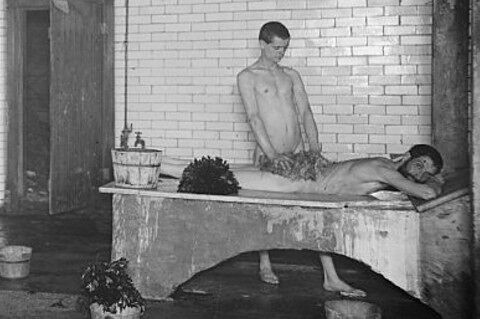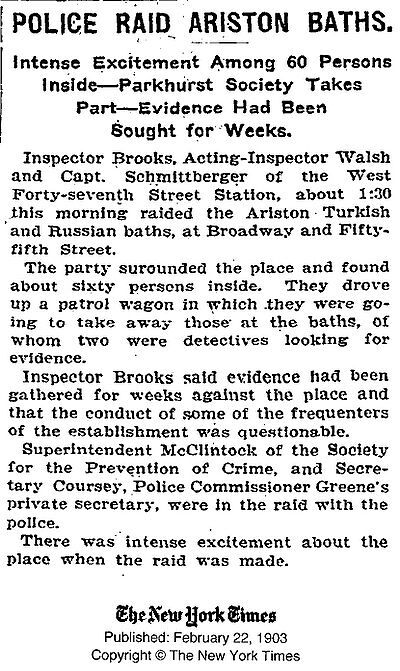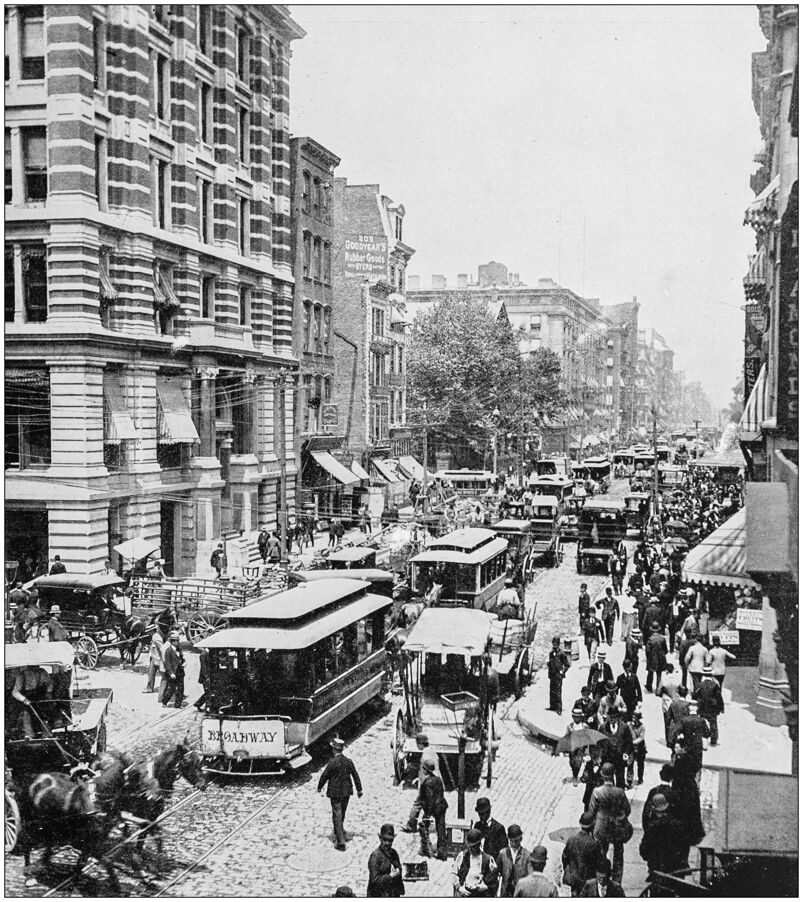
It’s easy to get bogged down by all the anti-LGBTQ+ headlines as of late–from drag bans to rolling back protections for trans people. But these are not new. The United States has a long and enduring legacy of anti-queer policing, even in states now safe(r) havens for gay people.
For instance, the first violent policing of gay spaces happened in 1903 at the Ariston bathhouse in New York City. It set the stage for Stonewall and other anti-gay incidents in America, but is an often-forgotten moment in queer history.
It was raining in New York City on February 21, 1903, so going to the Ariston bathhouse, a haven discreetly nestled on the bustling cross-street of Broadway and 55th, was a great indoor activity. Unbeknownst to its patrons, however, it would also be a night that bore witness to an unprecedented incursion on queer life that set a dreadful precedent for decades to come.
That evening two police agents covertly entered the Ariston bathhouse to set the stage for the first documented anti-gay police raid on an American establishment. Within hours, a police battalion swept in, sequestering all 78 men in the space, arresting 34 men, and charging 16 with sodomy, and leaving the remaining patrons with warnings.

These bathhouses, humming with whispered secrets in their steam-filled sanctuaries, served as solace for queer men away from the judgment of society’s prying eyes. However, their seemingly safe confines were not entirely immune to the long arm of the law.
The trials that followed the Ariston raid revealed an intriguing dichotomy. 12 of the 16 men went to trial, and the transcripts portray a vivid portrait of homophobia, but also reveal the comical absurdity of a society so deeply uncomfortable with homosexuality yet wanting such exact, specific details of what occurred.
Here’s a small snippet of one of the trial transcripts. The five surviving Ariston Bathhouse Raid trial transcripts were digitized in 2017 by the library of the City University of New York alongside the other:
Lawyer: Now, did you notice the state of the defendant’s genital organ or penis, at the time that, as you say, he placed it in the anus of the man Walter Bennet
Witness: Yes, sir.
Lawyer: In what state was it?
Witness: It was in a state of erection.
Lawyer: And what, if anything, did he do to Bennett other than that act?
Witness: Oh, he laid down, after he withdrew his penis from –
Lawyer: Well, after he withdrew his penis, did you notice the penis of the defendant?
Witness: Yes, sir.
Lawyer: And in what condition was the penis of the defendant, after he had withdrawn it from the anus of Bennett?
Witness: In a state of collapse.
The grim aftermath saw seven of the twelve men on trial sentenced to multiple years in prison. There were no protests, no rallies, no public outcry of support. The men were carted off to serve their sentences, disappearing into the annals of an early America fraught with homophobia.
While some served their full sentences, not all of the men stayed behind bars. As is the case today, privilege could get you far in 1903.

One of the convicted, George Galbert, a.k.a. George Alfred Caldwell, was part of a rich and well-connected family and he worked for famed architect John Carrere. Influential figures, including President Theodore Roosevelt, his daughter Alice, New York Governor Benjamin Odell Jr., and railroad tycoon Edward Merriman, intervened on his behalf according to news reports.
The incident’s lasting impact was profound, extending far beyond the lives of those directly involved. Gay bathhouses and similar spaces, like the YMCA, remained essential social and sexual spaces for the queer community. The practice of raiding these establishments continued.
More than a decade later, in 1916, another raid on the all-male Lafayette Baths marked yet another chapter of brutality against the LGBTQ+ community, another precursor to the Stonewall Riots of 1969.
The Ariston Bathhouse Raid is a critical fragment of queer history, a grim reminder of a past filled with widespread prejudice. As we grapple with a present mired in the rollback of protections for queer people, the Ariston Bathhouse Raid underscores the need for our collective resistance against the erasure of hard-won freedoms.
It’s been 120 years since that fateful night in 1903; it’s high time we stop repeating the same sordid history.


















SFMike
The Christofascist right is ready and willing to bring this kind of oppression back to America and sadly they become more successful every week and add that to red state voter oppression are likely to bring back the bad old days of gay oppression as soon as our next election.
S.anderson
The author is SERIOUSLY suggesting that this had to do with Lesbian, Transgender, Queer or +Allies culture? These were Gay/Bisexual/Closeted CIS men! They would have never identified with the LTQ+ labels nor tolerated being assigned those things. Writing them up as such is ASSIMILATION, and does harm to truth and history. Please do a better job of researching.
abfab
You know little to nothing about the history of Manhattan. And you’re not afraid to show it.
monty clift
@S.anderson, Right! These laws affected gay men mostly, but they are trying to obscure the facts by adding in the other letters.
abfab
The only obscurity here is you, monty clift. You are a provincial little Princess with very little desire to learn and grow up. You will remain at a great disadvantage.
monty clift
@abfab, I’m not interested in your QAnon babble. You don’t know anything about our (gay) history because you’re not one of us, and it shows.
abfab
Like you……a weak, boring, lame and predictable comment. Go out and mingle.
monty clift
@abfab, It doesn’t look like you’re doing any “mingling” in your life since you’re sitting here malding in the comments, lol.
Openminded
@ S.anderson, you obviously don’t understand the meaning of Allies. Maybe this only targeted Gay men, but it affects all the members under the LGBTQ umbrella. You chose to ignore the whole point of the story with your argument.
abfab
Malding Monty. Oh yeah, you’re Gay and 104 years old….thanks for confirming. Now fuc kk off would you. You’re ugly. We can see why you chose Mr Clift…to hide your scars.
decrans
I always envision Abs as a septuagenarian Santa Claus rubbing one out and then typing hate-filled Queerty comments, ones riddled with errors from his sticky hands.
dbmcvey
You’ll never be happy Derek aka Ernst Rohm. Ruining other people’s lives isn’t the key to happiness.
decrans
It is the key to helping make sure that autistic teens aren’t shoehorned into a lifelong medicalization process and end up deforming themselves unnecessarily, though. That’s the key there, Dave.
decrans
Not Derek. I’ve no doubt slept with more Latino and Hispanic men than you and WHITEBRED Mayo’ Pete. He got ZERO PERCENT of the Black vote. Thank you and good night.
barryaksarben
I get so tired of the word police. If those men were here today they would identify with our little growing alphabet. They scream bloody murder if you call any historical figure gay as that word want used that way way back when. So Fn what they were attracted to other men and they did all the fun nasty stuff we do today so if I want to call Cicero gay I fn will and you know exactly what I mean. If someone LIVED back then as a GAY man he was gay or and invert it doesnt matter because he was a same sex lover . It is a stupid pointless exercise I for one will not waste a minute of my time being insulted or horrified but this exactitude. We have much more pressing problems dont you think.
JClark
You make a good — and I think valid — point.
abfab
Like all of her posts, she makes an ignorant point.
gardenflat
Funny how this article is “queer” this and “queer” that, when those would have been the very words used by cops during the arrest of these gay men.
“Queer” is a catch all, not a substitute for “gay men”. Gay men fought so hard for decades and now articles like this lump them into a “queer” pile.
It’s as if a revoltution never happened for these men. They fought so hard, and now the media throws the word queer at them, just like the cops did.
abfab
Get over it.
monty clift
Misleading headline. It should be anti-gay, not anti-LGBTQ+, since it was only directed at gay men.
abfab
You are not a journalist, god for bid, and you were not there. Shut your trap.
S.anderson
@gardenflat: I get the impression that LGBTQ media doggedly transcribes the words lesbian, gay, bisexual to “queer” for two reasons. 1) To promote the notion that it’s the preferred term by any right thinking person, past or present, 2) To avoid the wrath of those who police the dominant use of “queer” instead of other identities. In other words, it’s fashionable to assimilate everyone and cancel those who put up any resistance. It’s not the act of a good, kind human being.
abfab
”by any right thinking person”
Oh dear, what shall we do with you? Judgemental bitch. Be gone. Go live in Florida.
BikeHulk
Some people use the word queer differently than you do. I’m in the reclaimed word camp, myself.
still_onthemark
An excellent book on this era is “Gay New York” by George Chauncey which goes into detail about the Ariston and other raids.
It’s important to note that the subtitle is “Gender, Urban Culture, and the Making of the Gay Male World 1890-1940.” Dress up, drag, hanky and other codes – all were crucial back then if you wanted to get laid. (They did have telephones back then, but getting Grindr past that party line operator was a bitch, lol.)
abfab
One ringy-dingy…..two ringy-dingy……
abfab
Not one mention of Bath House Bette or Barry Manilow. There really are no Gay men here, I’m convinced………………xo
Where are all my NY homeboys and goils!!!! NYC bath houses……………….OMG, wow. WOW!
Brian
You have a learning disability and a mental illness. We see it almost every day.
decrans
I keep telling him about Depakote.
inbama
@Brian
Nine bullying posts on this page alone.
Can you imagine how hated she is by people who know her in real life?
Diplomat
LoL Abcrab just needs his diaper changed. Then he’ll only be half as lewd.
abfab
We get it…you’ve never been to a bath house, you’ve never been to Manhattan and you’ve never developed a sense of humor.
You’re boring and you’re straight. Now drop dead.
Diplomat
With poopie diaper syndrome, multiple changes a day would turn any man psychopathic. Mr. poopie mouth is no exception.
abfab
Dip. Grow up.
Diplomat
And he thinks he’s an adult. Adults don’t wear diapers.
dbmcvey
Diplo, have you never heard of adult diapers? And why are you going on and on about diapers? Take that to a different site.
Kangol2
@Abfab, Mt. Morris Baths, West Side Sauna, East Side Sauna, Man’s Country, Wall Street Sauna, St. Mark’s Baths, Everard Baths, take your pick (and dial back the clock a little or a lot, but….)
abfab
The Wall St Sauna on Maiden Lane…………yes yes yes. It took a bad hit on 9/11….I really don’t see how it could have survived.
abfab
Kangol! Did you leave out the chain that made sure there was a port in every call??????
Club Baths
From Wikipedia, the free encyclopedia
2005, Club Washington
Club Baths was a chain of gay bathhouses in the United States and Canada with particular prominence from the 1960s through the 1990s.
At its peak it included 42 bathhouses: Akron, Atlanta, Atlantic City, Baltimore, Boston, Buffalo, Camden NJ, Chicago, Cleveland (two locations), Columbus Ohio, Dallas, Dayton, Detroit, Hartford, Houston, Indianapolis, Jacksonville, Kansas City, Missouri, Key West, Los Angeles, Miami, Milwaukee, Minneapolis (“opening soon”), New Haven (“opening soon”), New York, Newark, New Jersey, Philadelphia, Phoenix, Pittsburgh, Providence, St. Louis, San Francisco, Tampa, Toledo, Ohio, Washington, DC, London Ontario, and Toronto.[1]
The chain claimed to have at least 500,000 members. Most of the bathhouses were closed in the 1990s either by government agencies or a changing market after charges were made that it contributed to the spread of AIDS.[2]
The Club was founded in 1965 by John W. Campbell (generally known as “Jack”) (born 1932) and two other investors who paid $15,000 to buy a closed Finnish bath house in Cleveland, Ohio. Campbell wanted to provide cleaner, brighter amenities which were a contrast to the dark, dirty environment that existed previously.[2]
Campbell, a former president of the University of Michigan Young Democrats and a member of the Cleveland Mattachine Society, was active in gay politics and was on the Board of the National Gay Task Force. At one point while encountering Troy Perry, founder of the Metropolitan Community Church, Perry was said to have told him “we have a hundred churches and a total of 30,000 members.” Campbell replied, “Well, although we only have thirty churches, we have 300,000 members.”[2]
Campbell would be active in the fight against the Save Our Children campaign, headed by Anita Bryant in the late 1970s.
The facility in Toronto, Ontario, was one of four bathhouses raided on February 5, 1981, in a police action known as Operation Soap.[3]
Bathhouses that today claim a Club Baths heritage include the CBC Resorts Club Body Center which has bathhouses in Miami, Florida, Philadelphia, Pennsylvania, and Providence, Rhode Island.[4] and The Clubs which has facilities in Cleveland, Columbus, Fort Lauderdale, Florida, Dallas, Texas, Houston, Texas, Indianapolis, Indiana, Orlando, Florida, and St. Louis, Missouri.[5]
dbmcvey
This article brought out most of the antigay conservative trolls.
inbama
No, there was just one anti-gay troll here until you arrived.
Then there were two.
dbmcvey
Look at inbama trying to pretend he’s not an antigay conservative troll!
abfab
The antigay conservative trolls. What drives them? They are laughable and dumb as shit.
Diplomat
There’s the door diaper boys. Take the “T” with ya.
dbmcvey
Look at diplo writing random words. Is he trying to pretend he’s not an antigay conservative troll?
inbama
@dbmcvey
Quote a single anti-gay statement I’ve made, you lying scumbag.
decrans
Dave Matthews (aka dbmcvey, aka DMB, and various other troll accounts that he’s used to bolster support) never digs up a quote. He makes outlandish claims. And then, when I dig up my exact quote from Queerty, he rolls over like a small dog.
dbmcvey
Hey Derek aka descrans aka Ernst Rohm. You won’t be happy as a conservative just like you weren’t happy in any of your other alleged incarnations. It’s you, not the people around you. Work on yourself. Get help.
decrans
And where would that be? I was misdiagnosed by various doctors over the years. This question goes to the heart of the mental health care aspect where it overlaps with the trans debate. For you, it’s all tribal performance art. You don’t truly care about ‘helping’ the LGBTQ-adjacent community. It’s performative neoliberalism. And as I said various times before, the various groups y’all throw under the bus with every election cycle (the working-class, Blacks, Hispanics, etc.) sometimes come back to bite you in the rear come Election Day. A nice little performance routine, though.
decrans
And lastly, for the ten billionth, I’m not a conservative. They have solid ideas, and I came to understand their viewpoints after seeing hypocritical liberalism up-close. I am voting for Joe Manchin for president. I can keep copy-and-pasting that tidbit as well. You look shrill, Dave.
Bosch
Omg decrabs take your meds!
decrans
I do take my meds. In this neoliberal health care system, they’re generic, though. And I don’t see you or the other neoliberals with your faux “healthcare is a human right” outrage blatherings doing anything to change that with your political leaders, Bosch.
Bosch
You’re a generic troll, I don’t see the problem.
decrans
I love how certain neoliberals constantly whine about mass shootings. When they’re confronted with America’s mental health crisis, they defer to the trans demo and gatekeeping. That’s like allowing a certain segment of patients to overrun the nut house. A real fine strategy y’all have going on here, gang.
Bosch
It’s quite disgusting how you’re trying to make problems with the health care system seem worse than the murder of children.
You’re really messed up.
SantaFeJack
OMG, what fond and exciting memories I have of bathhouses all across the country! But especially in the big cities. Fortunately, my days were before HIV and after police raids.
Diplomat
For public info: Abfab and dbmcvey, are STR8 anti-gay borderline personality girl wannabes w penis rejection syndrome. They along with other screaming trans activists use LGBs and the gay flag to push their violent agenda of insane anti American anti social behavior. For more info go to Youtube and google and search transgenderism controversy. These psychotic trans activists need a serious blast of highly publicized LGB backlash to curb the damage they have done to the LGB community.
dbmcvey
For public info “Diplomat” is an anti-trans activist who lies for a living. He’s not to be trusted. We can see what a jerk he is just by the “LGB” thing he always does. The damage is due to cowardly conservatives like the many who showed up on this story that was just about part of the history of bathhouses, but they had to make it about their weird anti-trans and diaper obsessions.
decrans
Dave Matthews, do you literally repeat the same crap with every poster? What’s the point of this? That’s a sad life, bro.
decrans
I’d also like to add that I never said one anti-gay or anti-trans thing in this post. I just casually mentioned that I pictured abscrabs as a pot-bellied Santa Claus eating a ham husk with one hand and dripping semen on his keyboard with the other. That’s why he can’t type for sh-t. That and the previously mentioned learning disability, bless his heart.
Diplomat
This is how trans push every aspect of their agenda:
youtube.com/shorts/538vs_c7oZQ?feature=share
inbama
@decrans
Good link for anyone who’s never heard of autogynephilia or has been told it doesn’t exist.
The hatred this straight-guy-who-identifies-as-lesbian because they reject him is obvious.
As I’ve said before, autogynephiliacs have zero in common with naturally effeminate homosexuals who suffer gender dysphoria in childhood. The latest brain scans show that they do not exhibit the brain atypicality in the gender regions that androphilic transwomen and gay men do. That’s why that transwoman rages and threatens physical assault like a man.
abfab
Sweet how you two have one another to relate to.
abfab
Mick Jagger, Andy Warhol and Alfred Hitchc ock all frequented the decadent New York bathhouse – as did the police who constantly raided it. Its 87-year-old founder, Steve Ostrow, explains how Continental Baths made club culture what it is today
Sam Davies
The Guardian
Fri 27 Apr 2018
It’s 1968. Steve Ostrow and his wife, Joanne, sit in their car opposite the Everard Baths, New York City’s most popular public bathhouse. Hundreds of people are queueing to get in. Ostrow watches on, his eyes widening. Despite its popularity, he is not impressed with the Everard – or “Ever-hard” as some call it. It is typical of the city’s clubs: sleazy, secretive, unkempt, not to mention unfriendly to its gay clients. Homosexuality is illegal in the state of New York. “Hey, Joanne,” says Ostrow, turning to his wife. “We can’t miss.”
Shortly after his stakeout of the Everard, Ostrow, an opera singer by profession, opened the Continental Bathhouse. Located in the basement of the Ansonia hotel on New York’s 74th Street and Broadway, the Continental had around 400 private rooms, a sauna, a swimming pool and – eventually – a dancefloor. Over the next eight years, it became a cultural hub for music, clubbing and queer culture, providing gay men with a safe space unlike anything that had been seen before.
This story will soon be told on the big screen. Working with the novelist KM Soehnlein, the director Aron Kantor is developing a fictionalised version of the Continental’s rich history, adapted from Ostrow’s memoir, Live at the Continental Baths.
part one
abfab
part two
Now 87 and living in Sydney, Ostrow looks back fondly on the Continental era. The cleanliness of the Baths was – and still is – a source of great pride. “I had been to a few clubs,” he says. “But they turned me off. They were dirty … filthy. They treated you like shit.” But at the Baths, “from the first night, there were lines around the corner”.
To begin with, the Baths were a social space where gay men could meet, swim, relax and have sex, but, as their popularity grew, Ostrow began booking entertainment. “I built a disco room, a DJ booth, and these special things where you put the records: ‘turntables’!” he laughs. “It was spectacular. People would dance in their towels, bathing suits, nude or anything!”
For the first time in dance music history, the stage – designed specifically for a DJ – was set. Many took their turns behind the decks, including two precocious New Yorkers called Larry Levan and Frankie Knuckles. (“Very, very special,” says Ostrow of Knuckles.)
Knuckles and Levan – as well as Bobby “DJ” Guttadaro, David Rodriguez and Joey Bonfiglio – began performing at the Baths in 1974 for $25 a night. Levan became renowned for his flamboyant charisma and Knuckles for his focus and dedication. Both mixed using three turntables, a skill learned from their mentor, Nicky Siano. As disco was born, Continental DJs were breaking out classic tracks, such as Donna Summer’s Love to Love You Baby and South Shore Commission’s Free Man.
After leaving the baths, Levan and Knuckles would go on to etch their names into dance music history: Levan spent a decade playing as a resident at the Paradise Garage, another seminal venue, which opened in Manhattan in 1977. Knuckles moved to Chicago and its Warehouse venue, where he helped develop the house music sound.
abfab
part three
In Malcolm Ingram’s documentary, Continental, Knuckles recounts one particular night at the Baths when LSD was dropped into the fish tanks, making the fish repeatedly jump out of the water for the rest of the night. Ostrow says can’t remember that incident, but recalls the club’s vending machines being full of drinks laced with acid and ecstasy. “But when I saw it, I got it out of the damn place,” he hastens to add. “If people got out of hand, we got them out and we never let them in again.”
Nevertheless, word of the Baths’ vibrant, lascivious atmosphere spread. Continental regular David Wallace moved to New York in the 70s and believes he may have come into sexual contact with as many as 10,000 people in that period. “You don’t understand what it was like in the 70s,” he says. “There was no such thing as Aids. If you went to the Baths and there were 20 guys in the steam room, half an hour later you came out and you’d had some sexual contact with at least half of the guys in that steam room. And then after another half an hour, I’d go in the Jacuzzi, then I’d go in the sauna, then the whirlpool … By the time I’d left, I’d have had some sexual contact with 150 different people.”
abfab
There’s more in The Guardian, including vintage photos. A great read! Don’t you just love Gaystory!
inbama
The Club Baths in NYC was small, but it had one thing going for it. If you pulled an all nighter, it was a short walk for an early morning breakfast of espresso and a cannoli at Venieros Bakery.
Those were the days.
abfab
The only thing small at the Club Baths was you.
inbama
Leave it to you to spoil a lovely memory.
But then, you spoil absolutely everything, don’t you?
abfab
Enjoy your cannoli? Likely all you ended up with that night after they asked you to leave.
Pietro D
Stop bickering over nothing!